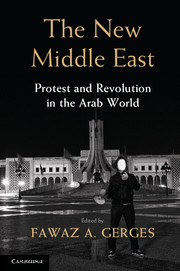Book contents
- Frontmatter
- Contents
- List of Figures and Tables
- Contributors
- Acknowledgments
- 1 Introduction
- Part I Context and Causes
- Part II Thematic and Comparative Aspects
- 6 The Politics of Resistance and the Arab Uprisings
- 7 Egypt’s 25 January Uprising, Hegemonic Contestation, and the Explosion of the Poor
- 8 The Military amidst Uprisings and Transitions in the Arab World
- 9 Women, Democracy and Dictatorship in the Context of the Arab Uprisings
- 10 Dangers and Demon(izer)s of Democratization in Egypt
- Part III Countries in Turmoil
- Part IV Regional and International Implications
- Selected Bibliography
- Index
- References
7 - Egypt’s 25 January Uprising, Hegemonic Contestation, and the Explosion of the Poor
Published online by Cambridge University Press: 05 June 2014
- Frontmatter
- Contents
- List of Figures and Tables
- Contributors
- Acknowledgments
- 1 Introduction
- Part I Context and Causes
- Part II Thematic and Comparative Aspects
- 6 The Politics of Resistance and the Arab Uprisings
- 7 Egypt’s 25 January Uprising, Hegemonic Contestation, and the Explosion of the Poor
- 8 The Military amidst Uprisings and Transitions in the Arab World
- 9 Women, Democracy and Dictatorship in the Context of the Arab Uprisings
- 10 Dangers and Demon(izer)s of Democratization in Egypt
- Part III Countries in Turmoil
- Part IV Regional and International Implications
- Selected Bibliography
- Index
- References
Summary
Abstract
While Middle East history and politics is often studied in top-down ways, the uprising of 25 January 2011 in Egypt is a reminder that politics is not just about foreign meddling, elite decision making, institutional power, the security forces, and vested interests. Contentious and unruly politics, non-state actors, the popular political imagination, the appropriation of ideas across borders, and highly motivated collective action also play an important role in shaping the political field. This chapter offers a preliminary assessment of the role of this popular politics in Egypt’s uprising and the removal of President Hosni Mubarak from power on 11 February 2011. My aim is to develop our relatively weak conceptual and empirical grasp of this popular politics. The premise is a rejection of culturally essentialist and exceptionalist (neo-)Orientalism on the one hand and that of materialist and Eurocentric modernism on the other. Unruly contestation is situated not in ‘Arab culture’ or in a modernist progression, but within a context of hegemonic contestation. This chapter argues that the educated youth, the labour movement, and the Muslim Brotherhood have attracted more than their fair share of scholarly attention, and that we must therefore assess the vital role played by the urban poor in the uprising, as well as the limitations of their forms of spontaneous mobilization. I argue that the riot police could not have been broken down without the defensive physical force provided by the urban poor, and that the army itself was heavily influenced by the demonstration of the popular will extant in the appearance of millions of ordinary Egyptians on the streets. Nonetheless, most ordinary Egyptians were ready to give the army a chance, at the very least, after the seizure of power by the Supreme Council of the Armed Forces on 11 February, a factor that was also vital in shaping the medium-term outcome of the uprising.
- Type
- Chapter
- Information
- The New Middle EastProtest and Revolution in the Arab World, pp. 155 - 179Publisher: Cambridge University PressPrint publication year: 2013
References
- 2
- Cited by



